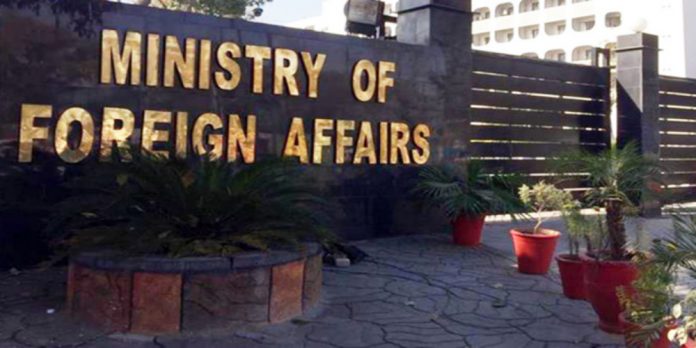| FO says Pakistan maintains neutrality over Russia, Ukraine war
| rejects report on alleged sale of weapons to Ukraine
By Asghar Ali Mubarak
ISLAMABAD: The Foreign Office on Monday rejected a media report regarding the alleged sale of Paki-stani weapons to Ukraine to get the International Monetary Fund (IMF) bailout package.
A report published by a foreign media outlet claimed that Islamabad reportedly engaged in ‘secret’ arms sales to the United States as part of a controversial bailout deal with the IMF earlier this year.
Responding to media queries regarding the issue, FO Spokesperson Mumtaz Zahra Baloch rejected the story as “baseless and fabricated”.
“The IMF Standby Arrangement for Pakistan was successfully negotiated between Pakistan and the IMF to implement difficult but essential economic reforms. Giving any other colour to these negotia-tions is disingenuous,” she added.
Baloch said that Pakistan maintains a policy of strict neutrality in the dispute between Ukraine and Rus-sia and in that context, does not provide any arms and ammunition to them.
“Pakistan’s defence exports are always accompanied with strict end user requirements,” she conclud-ed.
The Intercept report stated that the IMF bailout package has led to severe structural policies and high inflation in Pakistan, resulting in widespread protests by various groups, unaware that their current plight is a result of decisions made by the country’s financial and political elites, which also support a foreign war.
In April 2022, former prime minister Imran Khan was ousted from power through a no-confidence vote. State Department diplomats expressed their dissatisfaction with Pakistan’s supposedly neutral stance on the Ukraine conflict under Khan’s leadership and warned of consequences if he remained in power, said the US publication.
After Khan’s ouster, Pakistan became a valuable ally to the US and its allies in the war, and this support was allegedly rewarded with the IMF bailout. This emergency loan allowed the new government to delay elections and launch a nationwide crackdown on civil society, ultimately leading to Khan’s impris-onment, elaborated the publication and added that the future of democracy looks bleak in Pakistan.
Pakistan is known for producing basic munitions used in protracted conflicts, and report suggested that Ukrainian forces have used Pakistani-produced munitions and other ordnance. However, neither the US nor Pakistan has officially acknowledged this arrangement.
Leaked documents detailing the arms transactions were provided to The Intercept by an anonymous source within the Pakistani military. Some of these documents were authenticated through various means, including matching signatures and reviewing publicly available Pakistani disclosures of arms sales to the US.
According to the publication, the arms deals were brokered by Global Military Products, a subsidiary of Global Ordnance.
The economic capital and political support garnered from the arms sales played a significant role in se-curing the IMF bailout. The State Department reportedly informed the IMF about the undisclosed weapons deal as part of the agreement.
To secure the IMF loan, Pakistan had to meet specific financial targets related to its debt and foreign investment, which it was struggling to achieve. The funds obtained from the sale of munitions to Ukraine helped cover this gap, easing economic pressure.
This also allowed the military government to postpone elections and intensify its crackdown on dissent, while the US remained relatively silent about the human rights violations taking place.
The situation has raised questions about the trade-off between supporting Ukraine and potentially compromising democratic values in Pakistan. Critics argue that Pakistan’s democracy is at risk due to its involvement in the Ukraine conflict and the subsequent IMF bailout.
In May 2023, Pakistani Ambassador to the US Masood Khan met with Assistant Secretary of State Don-ald Lu to discuss how Pakistani arms sales to Ukraine could improve Pakistan’s financial position with the IMF.
The US agreed to inform the IMF confidentially about the arms program, which was believed to be worth $900 million.
This funding would help fill a gap in the IMF financing requirement.
The diplomatic discussions occurred just before the IMF’s review deadline for a billion-dollar payment, part of a $6 billion agreement made in 2019. Pakistani officials initially denied facing significant chal-lenges in financing the new loan. Still, later statements from the IMF representative contradicted these claims, leading Pakistan to seek additional financing.
The secret arms deal was seen as a crucial factor in helping Pakistan bridge its financing gap. On June 29, 2023, the IMF announced a new agreement with Pakistan with more favourable terms, valued at $3 billion, helping prevent an economic meltdown.
However, the precise details of how Pakistan overcame its financing obstacles remain unclear due to the secretive nature of the military project and its implications for the IMF review.
When the Ukraine conflict began, Pakistan, under Pakistan Tehreek-e-Insaf (PTI) chief, maintained a neutral stance, leading to tensions with the US. And yet, the US has denied interfering in Pakistani pol-itics despite facing allegations to the contrary.
Following Khan’s removal, the military regime embarked on a campaign to suppress his political party through violence and mass detentions, and Khan was imprisoned on various charges. The US has been criticized for its muted response to the crackdown, although it maintains that it supports Pakistan’s democracy.
The publication further stated that Pakistan’s new military leaders have made promises of foreign economic support to rescue the country, but there is scepticism about whether these promises will materialise, leaving Pakistan heavily dependent on the IMF, the US, and munitions production for the Ukraine conflict during an ongoing crisis.




